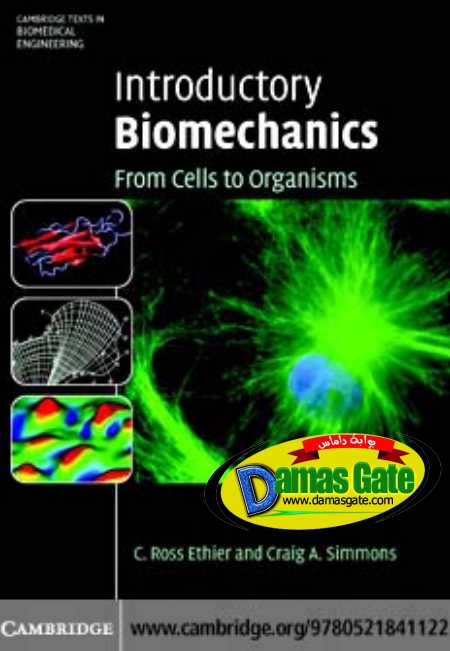Introductory Biomechanics From Cells to Organisms (Cambridge Texts in Biomedical Engineering) by C. Ross Ethier

Preface
For some years, we have taught an introductory course in biomechanics within
the Department of Mechanical and Industrial Engineering at the University of
Toronto. We have been unable to find a textbook suitable for the purpose of introducing
engineers and others having a “hard science” background to the field of
biomechanics. That is not to say that excellent books on biomechanics do not exist;
in fact, there are many. However, they are typically at a level that is too advanced
for an introductory course, or they cover too limited a subset of topics for purposes
of an introductory course.
This book represents an attempt to fill this void. It is not meant to be an extensive
treatise on any particular branch of biomechanics, but rather to be an introduction
to a wide selection of biomechanics-related topics. Our hope is that it will aid the
student in his or her introduction to the fascinating world of bioengineering, and
will lead some to pursue the topic in greater detail.
In writing this book, we have assumed that the reader has a background in
engineering and mathematics, which includes introductory courses in dynamics,
statics, fluid mechanics, thermodynamics, and solid mechanics. No prior knowledge
of biology, anatomy, or physiology is assumed, and in fact every section begins
with a review of the relevant biological background. Each chapter then emphasizes
identification and description of the essential aspects of the related biomechanics
problems. Because of the introductory nature of this book, this has led in some
cases to a great deal of simplification, but in all instances, we have tried to maintain
a firm link to “biological reality.”
We wish to thank Professor David F. James, of the Department of Mechanical
and Industrial Engineering, University of Toronto. He first developed the introductory
course in biomechanical engineering at the University and his course notes
provided the inspiration for parts of this book. Professors James E. Moore Jr.
and Takami Yamaguchi provided important material for Ch. 1. We have benefited
greatly from interactions with our students, who sometimes are the best teachers,
and our colleagues and mentors.
We shall be most grateful to students who, upon discovering errors in the text,
bring them to our attention.
Download
http://s18.alxa.net/s18/srvs2/02/003....Organisms.rar

Preface
For some years, we have taught an introductory course in biomechanics within
the Department of Mechanical and Industrial Engineering at the University of
Toronto. We have been unable to find a textbook suitable for the purpose of introducing
engineers and others having a “hard science” background to the field of
biomechanics. That is not to say that excellent books on biomechanics do not exist;
in fact, there are many. However, they are typically at a level that is too advanced
for an introductory course, or they cover too limited a subset of topics for purposes
of an introductory course.
This book represents an attempt to fill this void. It is not meant to be an extensive
treatise on any particular branch of biomechanics, but rather to be an introduction
to a wide selection of biomechanics-related topics. Our hope is that it will aid the
student in his or her introduction to the fascinating world of bioengineering, and
will lead some to pursue the topic in greater detail.
In writing this book, we have assumed that the reader has a background in
engineering and mathematics, which includes introductory courses in dynamics,
statics, fluid mechanics, thermodynamics, and solid mechanics. No prior knowledge
of biology, anatomy, or physiology is assumed, and in fact every section begins
with a review of the relevant biological background. Each chapter then emphasizes
identification and description of the essential aspects of the related biomechanics
problems. Because of the introductory nature of this book, this has led in some
cases to a great deal of simplification, but in all instances, we have tried to maintain
a firm link to “biological reality.”
We wish to thank Professor David F. James, of the Department of Mechanical
and Industrial Engineering, University of Toronto. He first developed the introductory
course in biomechanical engineering at the University and his course notes
provided the inspiration for parts of this book. Professors James E. Moore Jr.
and Takami Yamaguchi provided important material for Ch. 1. We have benefited
greatly from interactions with our students, who sometimes are the best teachers,
and our colleagues and mentors.
We shall be most grateful to students who, upon discovering errors in the text,
bring them to our attention.
Download
http://s18.alxa.net/s18/srvs2/02/003....Organisms.rar